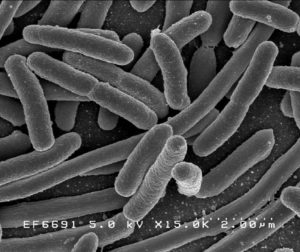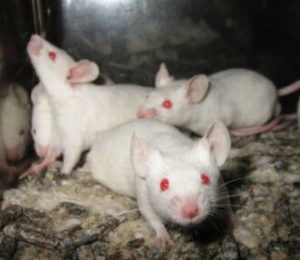
Escherichia coli, most commonly called “E. coli“,
is one of many bacteria found in the human gut.
As many of you probably already know, your digestive system is home to trillions of microscopic bacteria, fungi, and viruses. In common speech, these are called your “gut bacteria” (called “gastrointestinal microbiota” in fancy science jargon). By design, our bodies are supposed to have a healthy community of certain bacteria that constantly live here. In fact, our very health depends on having these bacteria live there, in our gut, all the time.
At the University of Wisconsin-Madison, researchers discovered that these bacteria can actually help turn genes on and off. The information taken from their study can be used to avoid illness, even sicknesses that are genetic.
They started by raising mice in a germ-free environment. They wanted to see what would happen if microorganisms were introduced only through the mice’s diets. As it turns out, the bacteria provided through their diet actually produced substances that “talk” to the mice’s cells. They even affected gene expression.
How did they figure that out? They fed one group of the mice a diet based on plants, giving them a variety of carbohydrates, like what people can get from a diet based on fruits and vegetables. The other group got what most Westerners tend to eat: a lot of fat and sugar.
The mice with a plant-based diet were a lot better off and had much more complex microbiomes. (In other words, their gut bacteria were a lot better balanced.) Something called “short-chain fatty acids” were produced when the gut bacteria ate up the nutrients in the plants. These fatty acids helped the bacteria to communicate a lot better with the mice’s genes and influence them positively. (FYI, these same fatty acids are also really important for colon health.)
And what about the mice who had a high-fat, high-sugar diet? Yeah, they

Germ-free mice were given two different diets.
didn’t do so well. Because there were fewer nutrients for their bacteria to consume, their number of short-chain fatty acids was a lot lower. This also meant that they bacteria couldn’t “talk” to the mice’s genes as well.
What surprised the researchers was that the microbiome didn’t just get chatty with cells in the stomach and colon.
It also struck up conversations with the liver and just about anywhere else in the body where fatty tissue was found. In other words, having a healthy gut isn’t only important for your colon and stomach; it’s something that affects your entire body.
In case you’re not already familiar with the bacteria of the gut, here’s the takeaway. To keep your body at its best: (1) you need healthy bacteria in your gut (versus other types of bacteria); and (2) you need to feed those bacteria the right foods. Eating a lot of plant-based dishes — yes, that means stuff like Brussels sprouts, spinach, and broccoli — is important for both. Initially, it will most noticeably affect number 2, but it will also eventually help with number 1, because the complexity and quantity of good bacteria in your gut will go up.
If you want to kick-start positive changes to your gut and help maintain a healthy microbiome, you can take a probiotic. Sure, maybe you can’t change your genes. That doesn’t mean you can’t take control of your life and health. You can affect how genes talk to each other and express themselves (how they act and what they produce). Stop treating bacteria like the enemy: some of them just want to help!
Source: https://www.sciencedaily.com/releases/2016/11/161123124256.htm
